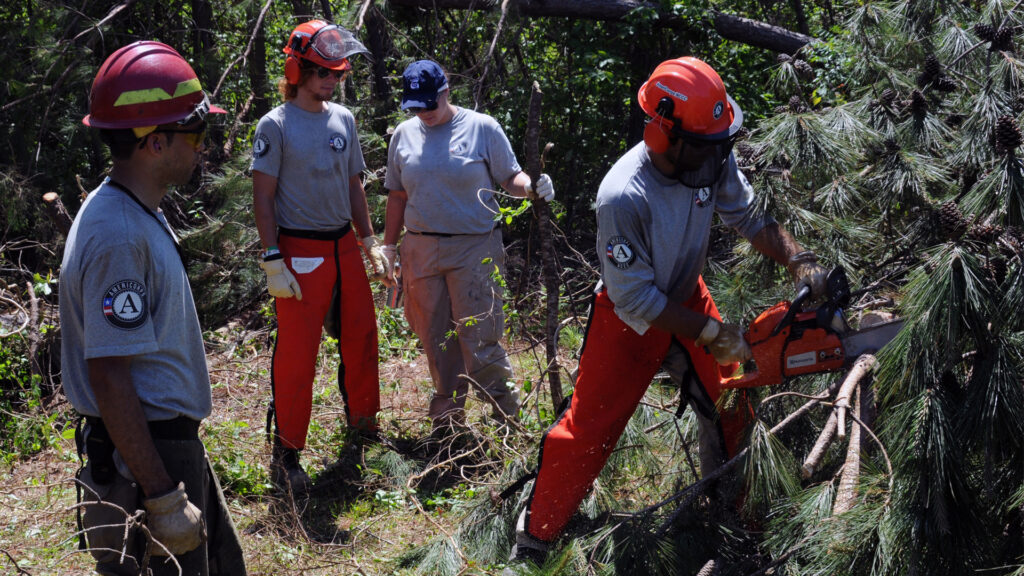By Kristan Reynolds, The Invading Sea
The American Climate Corps officially launched its website this spring and is offering multiple paid service opportunities for young Floridians to be on the front lines of combating climate change in local communities.
“The ACC website launch marks a significant step in our mission to address climate change through workforce training and service opportunities,” said Glennys Navarrete, Campus Compact program coordinator for the Campus Climate Action Corps, which is partnered with the ACC and offers service opportunities in DeLand. “Thousands of Americans are going to receive the skills through paid opportunities in clean energy, conservation and climate resilience.”
The Corps is part of a Biden administration initiative, providing about 2,000 paid opportunities confronting and mitigating climate change impacts to young Americans across 36 states, according to an AmeriCorps (the hub for ACC) press release. In Florida alone, there are three different positions taking several candidates in the cities of Miami, DeLand and Lakeland. The first group of Corps members will be deployed in June and the Corps website will be regularly updated with new positions, the release says.

“A couple of key initiatives in Florida will address climate change impacts on environmentally endangered lands, reduce the effects of urban heat islands (and) improve disaster resilience and recovery, while also increasing energy efficiency and reducing carbon emissions,” Navarrete said.
The American Climate Corps is based off of Franklin D. Roosevelt’s Civilian Conservation Corps of the 1930s, which put young individuals at work building national park bridges and infrastructure in the midst of the Great Depression, said Deborah Dorsett, executive director of the Greater Miami Service Corps, which is partnered with the ACC and offers service opportunities in Miami.
“It’s the same thing today where we have young people helping to address those needs, and at the same time, they’re developing themselves personally,” Dorsett said.
Dorsett says that members of the Corps will perform services to increase energy efficiency in homes such as installing LED light bulbs and sealing caulking around windows and doors to prevent air release. Corps members may also remove debris from drainage systems in order to prevent flooding in the community, along with a variety of other tasks.
Although the ACC is a nationally funded program, the services are specifically targeted at local underserved communities and households, including the elderly, Dorsett said.
“We want to make sure that we are placing the right information and the right assistance to help individuals understand and connect the dots behind how they’re being impacted by climate change and how they can provide solutions in their everyday routine,” Navarrete said.
Beyond providing immediate relief and education about climate change throughout communities, the Corps also aims to prepare the younger generation for a sustainable future and possible professional careers in climate resiliency and clean energy, according to the AmeriCorps press release.
“Eventually, we want to promote individual climate actions to help reduce climate impacts,” Navarrete said. “By raising awareness and connecting individuals of all demographics with resources and opportunities to lead in a sustainable future, we really are just hoping to give them the tools so that they can make these changes last forever without our help.”
According to Navarrete, Corps candidates have expressed an urgency about taking action against climate change and have heightened environmental awareness. Navarette has a similar sentiment to those she leads.
“The fact that I can serve on a program and help connect individuals making a difference in their community, and really helping in reducing climate impacts, is something that I’m very proud of,” Navarette said. “I think that Floridians should also take great pride in knowing that we are really leading this progress for our state.”
Kristan Reynolds is a Florida Atlantic University senior majoring in multimedia journalism and minoring in communication studies who is reporting for The Invading Sea during the summer 2024 semester.
Sign up for The Invading Sea newsletter by visiting here. If you are interested in submitting an opinion piece to The Invading Sea, email Editor Nathan Crabbe at ncrabbe@fau.edu.



